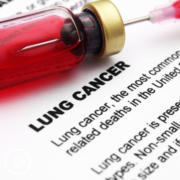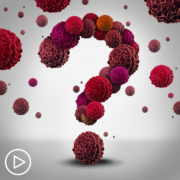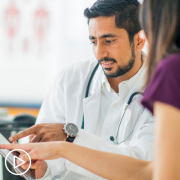Immunotherapy for Lung Cancer Treatment: What to Expect
Immunotherapy for Lung Cancer Treatment: What to Expect from Patient Empowerment Network on Vimeo.
Dr. David Carbone responds to a viewer question related to the symptoms, side effects, and efficacy of immunotherapy for non-small cell lung cancer.
Dr. David Carbone is a medical oncologist and professor of internal medicine at The Ohio State University. Dr. Carbone is also co-leader of the Translational Therapeutics Program at the OSUCCC – James, where serves as director of the Thoracic Oncology Center. Learn more about Dr. Carbone, here.
See More From INSIST! Lung Cancer
Related Resources:

|

|

|
Transcript:
Katherine:
We have received some questions from audience members earlier on. And so, David writes, “My care team has suggested immunotherapy to treat my lung cancer. I’m optimistic about the results, but nervous about symptoms and side effects. What can I expect?”
Dr. Carbone:
The immunotherapy is a potent therapy, but you have to understand, you’re dealing with lung cancer, which is a rapidly fatal disease when untreated. So, there’s a balance there. There’s a risk/benefit calculation that happens in picking any treatment.
And it turns out that I would say most lung cancer patients today have immunotherapy as part of their first treatment. Immunotherapy ramps up your own immune system to make it more effective at seeing the cancer, which has previously grown because it’s hidden itself behind a kind of invisibility cloak, and these immunotherapies remove this invisibility cloak so that the immune system can see it.
But at the same time, this process is a normal process that’s used to keep the immune system in check, and keep the immune system from attacking normal tissues, as well. So, it’s pretty common that we see people on immunotherapy have some kind of autoimmune side effect.
The most common side effect with immunotherapy is a skin rash, and usually it’s mild, and you just treat it with a topic corticosteroid, and it’s not a big issue. But it sometimes can be very severe. Like everything else, there’s a spectrum. I would say most patients have no skin problems; some have severe; and it’s almost always treatable. The next most common side effect is thyroid endocrine disorders. So, people will get thyroid function loss. And so, this is something that we follow carefully in the clinic, and people who are on immunotherapy.
And when we start seeing their thyroid levels going down, we just start them on thyroid medication, and that completely fixes that problem. So, but it’s usually permanent, and even after they stop immunotherapy, they’ll need to take thyroid medicines and adjust their thyroid levels.
And then, there’s a whole slew of other possible side effects that are less common. Some are very severe. Less than one percent of patients have a severe side effect called colitis, which causes diarrhea, which can even be life-threatening, but is also treatable if detected early. Very uncommon to be so severe, but patients should let their doctors know if they experience unusual diarrhea.
You can also have inflammation in your lungs called pneumonitis. So, if there’s an onset of shortness of breath, of course, you’ll tell your doctor, and that can be treated, as well. And anything else, there’s a huge list of other things. Arthritis, uveitis, other things that happen, but are pretty rare.






